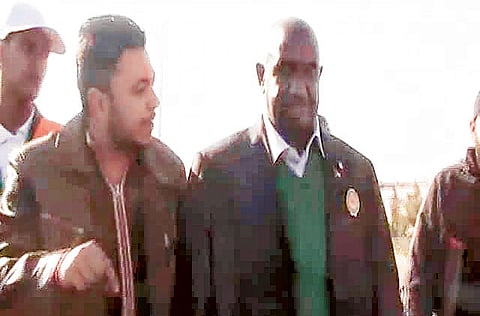Activists alarmed over Syria monitors' Sudanese head
Critics say Al Dabi is unlikely to recommend strong action

London: The choice of a Sudanese general to head an Arab League mission in Syria has alarmed activists, who say Sudan's own defiance of a war crimes tribunal means the monitors are unlikely to recommend strong action against Syria's Bashar Al Assad.
The Arab League says Lieutenant-General Mustafa Al Dabi brings vital military and diplomatic expertise to its unprecedented mission to verify that Al Assad is complying with a deal to end Syria's crackdown on protesters.
But some critics of Khartoum say it is all but impossible to imagine a Sudanese general ever recommending strong outside intervention, much less an international tribunal, to respond to human rights abuses in a fellow Arab state.
Eric Reeves, a professor at Smith College in Massachusetts, who studies Sudan and has written strong criticisms of its government, said the choice of a Sudanese general was a sign the Arab League might not want its monitors to produce findings that would force it to take stronger action.
"There is a broader question of why you would pick someone to lead this investigation... when he is part of an army that is guilty of precisely the sort of crimes that are being investigated in Syria," Reeves said.
"I think a Sudanese general would be one of the least likely people in the world to acknowledge these findings even if they are right there before him... It doesn't make any sense unless you want to shape the finding. They want it shaped in ways that will minimise the obligation to do more than they already have."
Syrian opposition activists are reluctant to publicly criticise a monitoring mission in which they have invested high hopes. But several have privately voiced concern over whether a Sudanese military man would be willing or able to take a hard stance towards Al Assad.
Al Dabi has held senior Sudanese military and government posts, including in the Darfur region, where the prosecutor of the International Criminal Court says the army carried out war crimes and the United Nations says 300,000 people may have died.
Al Bashir indicted
Sudan's President Omar Al Bashir has been indicted by the Hague-based ICC for genocide and crimes against humanity. Khartoum says the accusations are baseless and politically motivated, and puts the Darfur death toll at 10,000.
Al Dabi, 63, has flown to Damascus to lead about 150 observers assessing whether Syria is ending a nine-month crackdown on protests, the first foreign intervention on the ground in unrest that the UN says has seen 5,000 people killed.
He became head of Sudan's military intelligence in 1989, the day Al Bashir took power in a coup, and went on to head Sudan's foreign spy agency and serve as deputy chief of staff for military operations from 1996-99.
He has held at least four positions related to Darfur, including coordinator between Khartoum and international peacekeepers sent in after rebels complaining of political and economic neglect took up arms in the remote western region.
Jehanne Henry, Sudan researcher at New York-based Human Rights Watch, said that as head of Sudan's military intelligence in the 1990s, Al Dabi "certainly would have been in a position to know what the security services were doing at that time".
"As we and others have documented in reports from that period, the security services were implicated in serious human rights violations such as the arbitrary arrest and detention of political activists and their ill treatment and torture... He obviously does not fit the profile as a human rights monitor."
Troops kill three
Lebanese security officials say Syrian troops opened fire at a car that crossed illegally into northern Lebanon, killing three Lebanese men. The officials spoke on condition of anonymity in line with regulations.
The shooting came late on Tuesday as Arab League observers started a mission in Syria aimed at stopping nine months of bloody clashes during an uprising against the regime.
Some Syrians have fled to Lebanon, and Syria has complained that weapons are smuggled across its borders.



